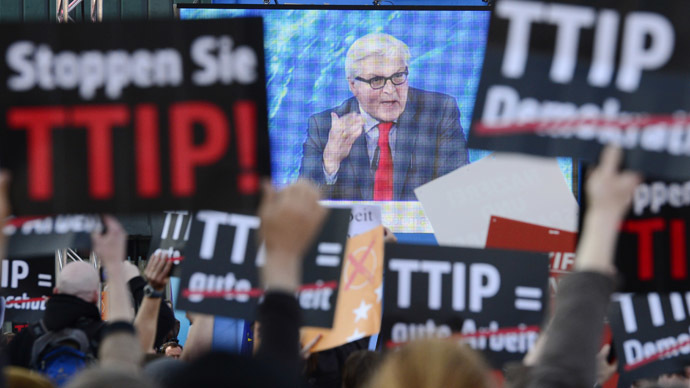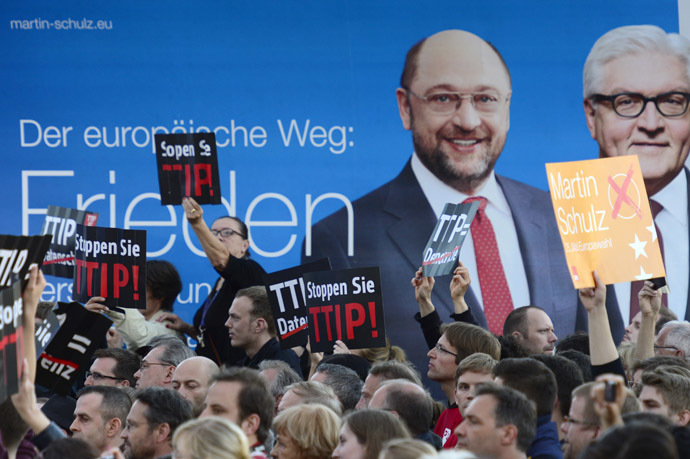TTIP: Is the European Commission digging its own grave?

The European Commission’s reputation is abysmal. Technocrats and faceless bureaucrats dominate public perception. Accountability and legitimacy are absent. So why did the Commission reject the latest European Citizens’ Initiative, and dig its own grave?
According to the Commission, the European Citizens’ Initiative on the Transatlantic Trade and Investment Partnership (TTIP) and the Comprehensive Economic Trade Agreement (CETA) - supported by more than 250 civil society organizations in 21 member states - does not qualify to be heard. In a letter to organizers, the Commission writes: “The proposed citizens’ initiative falls manifestly outside the framework of the Commission’s powers to submit a proposal for a legal act of the Union for the purpose of implementing the Treaties.” In other words, a European Citizens’ Initiative can take issue with EU laws but not with the Commission itself.
Thus, the European Citizens’ Initiative has been rendered wholly ineffective. In place since the Lisbon Treaty, it aimed at increasing direct democracy. By collecting a million signatures from at least seven member states, citizens could propose a legal act at the European level. But apparently one cannot do so if one’s initiative questions one of the Commission’s priorities for the year ahead.
This confirms campaigners’ worst fears. Bureaucrats in Brussels will continue to discuss CETA and TTIP behind closed doors. Critics warn that the trade deals which seek to deregulate food safety and consumer protection, introduce ISDS provision which will allow companies to sue states for potential loss of profits will ultimately undermine national sovereignty in an unprecedented way. A public discussion about the far-reaching consequences of these trade deals is out of question. Citizens will not have a voice whether they want to food safety and consumer protection deregulated, or multinational companies endowed with state-like powers.
The Commission must believe that any opposition will simply delay the process and makes failure more likely. The consultation on ISDS provision took three months and generated 150,000 submissions – a nightmare scenario for the Commission.
The Commission wants to avoid a repeat of the right2water campaign by any means. The campaign demanded affordable and non-privatized access to clean drinking water in 2013. It was the first initiative to collect more than a million signatures necessary and thus force a debate on the EU Commission. While European Citizens’ Initiatives are non-binding it was successful. The EU Commission and its agenda of water privatization were put on the back foot. A European Citizens’ Initiative on TTIP would most likely derail the TTIP negotiations all together given the broad opposition which already exists.

By shutting down the initiative, the Commission has made a huge mistake. It appears that the Commission is doing everything in its power to actively disenfranchise precisely those people who displayed some belief in the European institutions. It is sowing seeds of discontent instead of integrating NGOs into the process of policy-making. It is a mistake which not only the Commission will pay a high price for. It will also negatively affect other European institutions, and accelerate the crisis of representation in Europe.
This has far-reaching consequences and begs the questions: How can citizens in their member states reassert their popular will and sovereignty? Is it still possible to equate the European project with the European Union, European Commission and European Central Bank, as these fundamentally undermine the European idea and democracy? Is it time for a progressive EU-skepticism?
Campaigners, civil society organizations and progressive political parties which previously defended the EU and its institutions against a growing political right will now re-think their position towards the EU. They will no longer be able to argue that it is possible to reclaim the European Union and its institutions. As a consequence, they will move toward more radical tactics.
Nick Dearden, director of the World Development Movement said: “Nothing could more clearly show that these trade deals are a disaster for democracy on our continent. The European Union wants to stitch this deal together behind closed doors, because if it lets citizens anywhere near it, it won’t be able to control the opposition. But the people of Europe will not have this corporate power grab imposed on them – we will fight against this decision, and we will defeat these trade deals.”
While it will be more difficult to garner support without the European Citizens’ Initiative, it is likely to deepen the opposition to the respective trade deals. Campaigners who thought they would be starting to petition on September 25 will now be taking the legal route, hoping to get the decision reversed at the European Court of Justice.
The law should be in their favor as the scientific services of the German Bundestag already declared the initiative legitimate. But even if the legal strategy bears success, NGOs and civil society organizations will be taking to the streets on October 11. But protest will not stop there. After all, NGOs and civil society organizations learnt that it was the mass demonstrations and civil disobedience in Seattle 1999 or Cancun 2003 which derailed the World Trade Organization (WTO). European citizens can only hope that NGOs remember the lessons.
The statements, views and opinions expressed in this column are solely those of the author and do not necessarily represent those of RT.
The statements, views and opinions expressed in this column are solely those of the author and do not necessarily represent those of RT.













